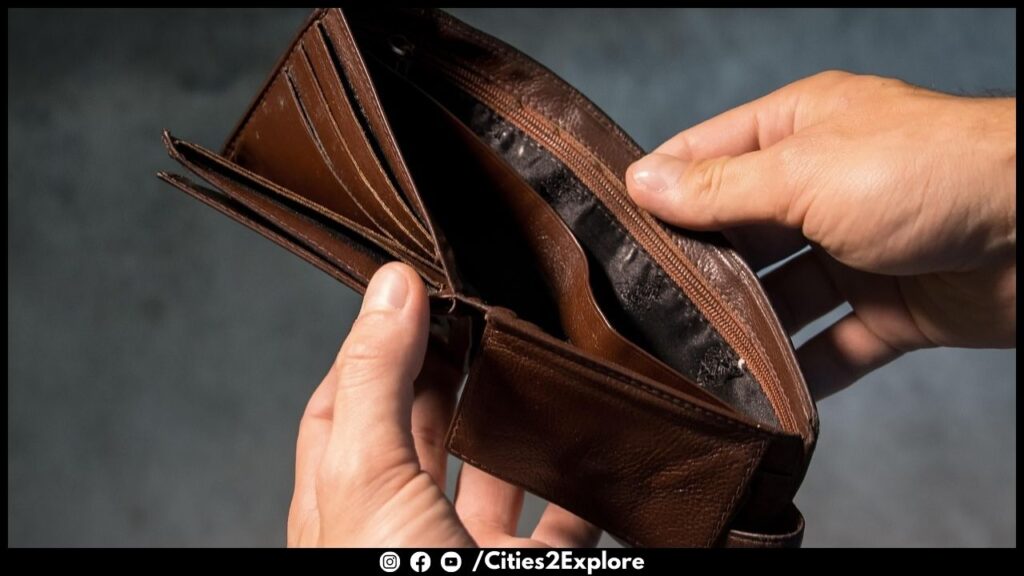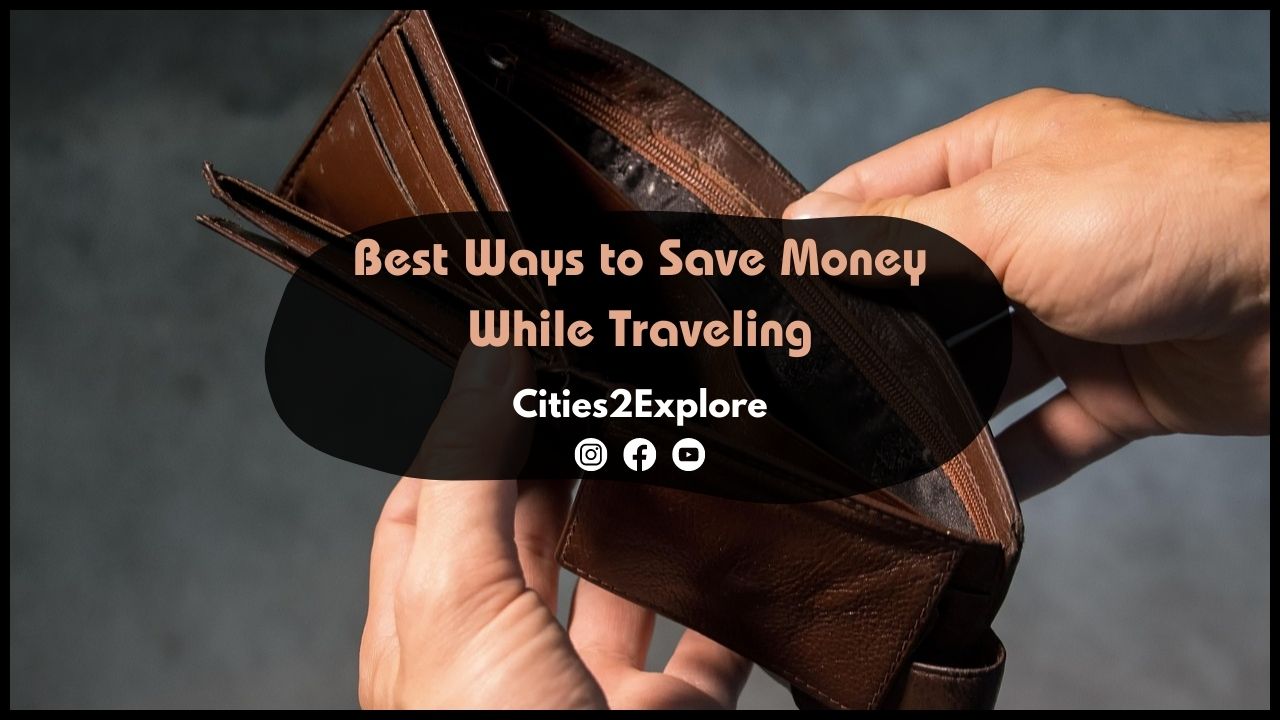
Traveling is an incredible experience that broadens our horizons and creates lasting memories. However, it often comes with a financial cost. In this comprehensive guide, we will explore the best ways to save money while traveling, allowing you to make the most of your adventures without breaking the bank. By implementing these money-saving strategies, you can stretch your budget further and enhance your overall travel experiences.
Pre-Trip Planning
Before embarking on your journey, effective pre-trip planning can significantly contribute to saving money. Consider the following tips:
- Researching and Comparing Prices
- Flights: Use flight comparison websites to find the best deals on airfare. Be flexible with your travel dates and times, as this can often lead to significant savings. Additionally, explore alternative airports near your destination for potential cost reductions.
- Accommodation: Compare prices and read reviews on accommodation booking websites. Consider staying in budget-friendly options such as hostels, guesthouses, or vacation rentals. If you’re open to unconventional experiences, home exchanges or couchsurfing can provide unique opportunities while saving money.
- Transportation: Research various transportation options, including trains, buses, and carpooling services. Walking or cycling within cities not only saves money but also allows you to immerse yourself in the local culture.
- Attractions and Activities: Look for free or low-cost attractions, such as public parks, gardens, and landmarks. Take advantage of city passes or tourist cards that offer discounted access to multiple attractions and additional perks like free public transportation.
- Choosing Budget-Friendly Destinations
- Consider traveling during the off-season when prices are generally lower, and destinations are less crowded. Off-season travel allows you to enjoy discounted rates on flights, accommodation, and activities.
- Explore affordable destinations known for their budget-friendly options, including accommodations, dining, and attractions. Research countries or regions with favorable exchange rates to maximize your purchasing power.
- Setting a Travel Budget
- Allocate funds for different expenses such as flights, accommodation, transportation, meals, and activities. Setting a budget helps you prioritize your spending and stay on track throughout your trip.
- Track your expenses during the trip using budgeting apps or spreadsheets. Regularly review and adjust your spending to ensure you’re staying within your budget limits.
Transportation

Transportation costs can make a significant dent in your travel budget. Here’s how you can save money on transportation:
- Booking Flights Strategically
- Use flight comparison websites to find the best deals on flights. Compare prices and consider booking directly with the airline for any potential discounts.
- Be flexible with your travel dates and times. Flying during off-peak hours or midweek often results in lower fares.
- Explore alternative airports near your origin or destination. Sometimes, flying to a nearby airport and taking ground transportation can be more cost-effective.
- Utilizing Budget Airlines and Deals
- Research budget airline options that offer lower fares compared to traditional carriers. However, be mindful of additional fees and restrictions, such as baggage allowances and onboard services.
- Keep an eye out for flight deals and promotional offers. Subscribe to airline newsletters or follow them on social media to stay updated on special discounts or flash sales.
- Exploring Alternative Transportation Options
- Consider taking trains or buses for shorter distances. They can be cheaper and provide an opportunity to enjoy the scenic views along the way.
- Carpooling or ridesharing services not only save money but also promote social interactions. Explore platforms that connect drivers with passengers heading in the same direction.
- Whenever feasible, explore your destination on foot or rent bicycles. Not only does it save transportation costs, but it also allows you to experience the local culture more intimately.
Accommodation

Finding affordable accommodation is crucial for saving money while traveling. Consider the following strategies:
- Choosing Budget-Friendly Accommodations
- Opt for budget-friendly options such as hostels, guesthouses, or budget hotels. These accommodations often provide comfortable stays at lower prices compared to luxury hotels.
- Consider renting apartments or vacation rentals, especially if you’re traveling with a group or staying for an extended period. These options often offer more space and the ability to cook your own meals, leading to additional savings.
- Camping can be an adventurous and cost-effective option, especially in nature-rich destinations with well-equipped campsites.
- Utilizing Accommodation Booking Websites
- Take advantage of accommodation booking websites that allow you to compare prices, read reviews, and find the best deals. Popular platforms include Booking.com, Airbnb, and Hostelworld.
- Look for discounted rates or last-minute deals. Many booking websites offer special promotions or discounts for specific periods or unsold inventory.
- Considering Accommodation Alternatives
- Explore unique accommodation options such as home exchanges or house-sitting. These arrangements allow you to stay in someone else’s home while they stay in yours, eliminating accommodation costs altogether.
- Couchsurfing, a platform that connects travelers with hosts offering free accommodation, provides an opportunity to connect with locals and save money on lodging.
Dining and Food

Food expenses can quickly add up while traveling. By being mindful of your dining choices, you can save money without compromising on the culinary experience:
- Eating Like a Local
- Explore local markets and street food stalls to taste authentic cuisine at lower prices. Not only do these places offer delicious meals, but they also provide insight into the local food culture.
- Venture away from tourist areas and seek out local eateries where prices tend to be more reasonable. Ask locals for recommendations or use food apps to discover hidden culinary gems.
- Cooking Your Own Meals
- Rent accommodations with kitchen facilities to prepare your own meals. Shopping at local grocery stores or markets for fresh ingredients allows you to experience the local food scene while saving money.
- Consider preparing simple meals or picnics for lunch while exploring your destination. This way, you can avoid costly tourist traps and have more control over your food expenses.
- Taking Advantage of Meal Deals and Happy Hours
- Research restaurants that offer discounted lunch menus, set meals, or early bird specials. Taking advantage of these offers can help you enjoy quality meals at reduced prices.
- Explore happy hours at bars or restaurants where you can enjoy discounted drinks and sometimes even appetizers or small plates. It’s an excellent opportunity to unwind and socialize while saving money.
Sightseeing and Activities
Experiencing the best of your destination doesn’t have to drain your travel budget. Follow these tips to save money on sightseeing and activities:
- Researching Free or Low-Cost Attractions
- Take advantage of free attractions such as public parks, gardens, and landmarks. Many cities offer stunning parks, architectural marvels, and iconic landmarks that can be enjoyed without spending a dime.
- Check if museums and galleries have free admission days or discounted rates for certain periods. Timing your visits accordingly allows you to explore the cultural heritage of a destination while saving money.
- Taking Advantage of City Passes or Tourist Cards
- Investigate city passes or tourist cards available at your destination. These cards offer discounted or free entry to multiple attractions, as well as additional benefits like free public transportation.
- Assess your sightseeing priorities and compare the cost of individual tickets to the price of a city pass. If the pass covers several attractions you plan to visit, it can lead to significant savings.
- Participating in Free or Low-Cost Local Activities
- Join walking tours or city tours led by locals who offer their insights and expertise. These tours often operate on a tip-based system, allowing you to determine the value of the experience.
- Check local event calendars for festivals, concerts, or cultural events that are open to the public. Participating in these activities not only enriches your travel experience but also provides a glimpse into the local culture without spending much.
Money Management and Banking
Efficient money management and understanding banking options while traveling can help you avoid unnecessary fees and currency exchange pitfalls:
- Informing Your Bank and Credit Card Companies
- Notify your bank and credit card companies about your travel plans to avoid any transaction issues or card blocks due to suspicious activity. Provide them with your travel dates and destinations.
- Inquire about foreign transaction fees and currency exchange rates associated with your cards. Choosing cards with low or no foreign transaction fees can save you money when making purchases abroad.
- Using No-Fee or Low-Fee ATM Withdrawals
- Find ATMs that offer favorable exchange rates and minimal or no withdrawal fees. Consider withdrawing larger amounts to minimize the number of transactions and associated fees.
- If possible, open a bank account that offers free or low-fee international ATM withdrawals. Such accounts are specifically designed for travellers and can be a cost-effective solution for accessing cash while abroad.
- Keeping Track of Expenses and Staying Within Budget
- Use budgeting apps or spreadsheets to track your expenses during the trip. Regularly review and categorize your spending to identify areas where you can save money.
- Adjust your spending habits if you notice that you’re exceeding your budget in certain areas. This awareness helps you make conscious choices and maintain financial discipline throughout your journey.
Local Transportation and Getting Around
Navigating local transportation efficiently can lead to substantial savings. Consider the following tips:
- Utilizing Public Transportation
- Research the local transportation options available at your destination. Determine if it’s more cost-effective to purchase day passes, travel cards, or single-use tickets based on your planned itinerary.
- Public transportation, such as buses, trains, or trams, is often cheaper than taxis or rideshare services. Familiarize yourself with the local routes and schedules to make the most of these cost-saving options.
- Walking or Cycling
- Explore cities on foot whenever feasible. Walking allows you to discover hidden gems, experience the local ambiance, and save money on transportation costs.
- Rent bicycles if the city has a well-established cycling culture. It’s an eco-friendly way to get around, stay active, and save money on transportation expenses.
- Sharing Rides or Carpooling
- Consider using ride-sharing services or joining carpool networks if you’re traveling with a group or meeting fellow travelers. Sharing the cost of transportation can significantly reduce individual expenses.
- Explore local carpooling options, especially for longer journeys between cities or towns. It allows you to split costs with locals or other travellers heading in the same direction.
Shopping and Souvenirs
Shopping for souvenirs and gifts is often an enjoyable part of travel. By being strategic and mindful, you can save money while still acquiring meaningful items:
- Being Selective with Souvenirs
- Instead of purchasing generic souvenirs, look for locally made and authentic items that reflect the culture and craftsmanship of the destination.
- Avoid overpriced tourist shops located in popular tourist areas. Venture into local markets, independent stores, or artisanal communities to find unique and reasonably priced souvenirs.
- Bargaining and Negotiating Prices
- In some countries, bargaining is a common practice. Learn about the local bargaining customs and negotiate prices for goods and services such as street market items, taxi fares, or tour prices. However, be respectful and mindful of cultural norms.
- Considerations for Duty-Free Shopping
- If you’re planning to purchase expensive items such as electronics or luxury goods, explore duty-free shopping options at airports or designated duty-free shops. Compare prices with your home country to ensure the savings are significant enough to justify the purchase.
Conclusion
Saving money while traveling is achievable with careful planning, smart choices, and a willingness to explore alternative options. By utilizing the strategies outlined in this guide, you can enjoy memorable experiences without straining your budget. Remember to research, compare prices, prioritize your spending, and make conscious choices throughout your journey. With a well-managed budget, you can embark on your travels with peace of mind and make the most of your adventures without breaking the bank. Safe travels!
Read other interesting articles:
- 11 Best Places to visit in Varanasi
- 11 Travel Essentials List You Need on Your Trip
- 7 Best Places to visit in Diwali Vacation in India
- Patna Museum : Things to Know Before Visiting
- Golghar Patna – Facts, History, Timings
- 11 Best Places To Visit in Patna
- Ultimate Guide: How To Handle Jet Lag And Adjust To New Time Zones While Traveling
- 11 Best Places to Visit in Rishikesh – Exploring City of Yoga
- Radhanagar Beach: Activities, Timings, Images & More
- Experience Royalty on Rails: Maharajas Express – The Luxury Train in India
- 11 Places to Visit in India in June: Beat the Heat and Explore!
- Explore the Pyramids of Giza: The Last Surviving Seven Wonders
- Exploring the Benefits of Traveling: Solo, Group, Health, and Educational Benefits
- How To Pack Efficiently And Avoid Overpacking: Your Ultimate Guide
- World’s Most Unique Village of Twins, Kodinhi – The Unexplained Mystery | Mystery Of Twins Village





